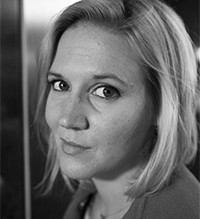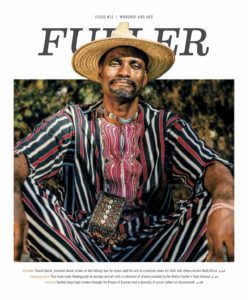
Meghan Easley (MAT ’16) has a memory from her elementary school days. She had just come home from school, and her father asked for her backpack. Taking out her pencil case, he began to tape a bunch of pencils together—and then gleefully declared, “I think I have it!” Meghan was puzzled. “You have what, Dad?” He explained that it was a prototype for a portable oxygen tank: one to replace the 60-pound albatrosses that at the time kept the infirm and elderly immobile. Dissatisfied with seeing such individuals having to choose between respiration or mobility, Meghan’s dad had just designed a solution. Eventually his pencil prototype went to market to become a mainstay of home healthcare, an industry he has remained in to this day. “My father has been a lifelong entrepreneur. I grew up with him ripping things apart and recreating them to show me what’s possible,” Meghan says. It seems that it was catching, as she came to bring that same unorthodox, innovative spirit to her own graduate study and subsequent work.
When Meghan began as a theology student at Fuller, she thought she would end up pursuing a vocation in youth ministry. Her studies began well, but quickly became cumbersome to her. Starting to sense that youth ministry wasn’t the right path after all, Meghan felt stagnant and trapped. “It seemed to me that the program equipped you for certain tracks—pastoral or academic tracks that my peers all envisioned following after graduation,” she recalls. “Over time I realized I wasn’t headed in those directions. But I didn’t know where I was headed.”
She spoke with her sister over the phone and expressed her concerns. Her sister, convinced that Meghan was hungering for practical application, mentioned “social entrepreneurship.” “I had never heard that term before, but I googled it and found a master’s program at USC in social entrepreneurship,” Meghan says. “The program was designed to help for-profit and nonprofit leaders bring business acumen to problems like poverty, violence, and other forms of inequity and injustice. That sounded great. But the deadline to apply was just two weeks away,” she laughs. After she hurriedly prepared her application and was accepted, Meghan faced a dilemma: which degree should she pursue? Inheriting her father’s distaste for an either/or choice, she paved a third way and pursued both her Fuller and USC degrees in tandem.
 Meghan’s mixing and matching of coursework at the two institutions proved to be catalytic in her own theological integration. Alongside her peers at USC, she was encouraged to imagine the ways that business could produce social good and renewal; it was an experience characterized by creativity rather than overt spirituality. If USC was a place where people asked “why” often—the “little whys” that make good design possible—Fuller was the space where Meghan enjoyed the affirmation and exploration of the “greater whys.” “At USC, there were very few Christians in my cohort of 50,” she says, “and often the case studies we looked at on poor social entrepreneurship highlighted Christian organizations. But it wasn’t a hostile environment. My faith was pruned there, and I think it grew. I saw my colleagues struggle with the contours of social good outside of a Christian framework. And where they couldn’t root the work in the worldview that I held, my community at Fuller helped me to do so.” Moreover, her theological training helped her understand social entrepreneurship as not just simple renewal or social uplift, but as one of many extensions of God’s grace and redemption.
Meghan’s mixing and matching of coursework at the two institutions proved to be catalytic in her own theological integration. Alongside her peers at USC, she was encouraged to imagine the ways that business could produce social good and renewal; it was an experience characterized by creativity rather than overt spirituality. If USC was a place where people asked “why” often—the “little whys” that make good design possible—Fuller was the space where Meghan enjoyed the affirmation and exploration of the “greater whys.” “At USC, there were very few Christians in my cohort of 50,” she says, “and often the case studies we looked at on poor social entrepreneurship highlighted Christian organizations. But it wasn’t a hostile environment. My faith was pruned there, and I think it grew. I saw my colleagues struggle with the contours of social good outside of a Christian framework. And where they couldn’t root the work in the worldview that I held, my community at Fuller helped me to do so.” Moreover, her theological training helped her understand social entrepreneurship as not just simple renewal or social uplift, but as one of many extensions of God’s grace and redemption.
Meghan sees so much potential for the church and theological education to embrace our culture’s current enthusiasm about entrepreneurship. “Think of how much our world is shaped by it today! Uber. Facebook. Apple. We need innovative Christian voices in these industries,” she says with conviction. “I’m not simply talking about ‘how to be a Christian at my job.’ I mean that beyond our moral influence in the marketplace, we should also channel our energy to make the world more just, more whole, more beautiful. Why wouldn’t we want to do that? Why wouldn’t we want to shape the overarching values of our startup culture so that it is redemptive instead of exploitative? This can be a key part of our Christian witness.”
After Meghan graduated with both master’s degrees, she began dialoguing with a Fuller trustee who mentioned an organization called Praxis, founded in 2010 with a mission to advance redemptive entrepreneurship. According to Praxis, redemptive entrepreneurs are those who spend themselves on behalf of others, using their personal and organizational power “to bind up the brokenhearted, to proclaim freedom for the captives, and release from darkness the prisoners” (Isaiah 61). They renew culture out of love for their neighbors. Praxis’s endgame is to produce such leaders by creating an ecosystem that supports them: mentors, wise funders, other practitioners, and the spiritual practices and resources required to launch redemptive ventures.
Meghan was sold on the mission. In fact, bringing her dad’s innovative spirit to the table, it felt like her dual degrees had been her own prototype of preparation for this kind of work. “Praxis was truly the first place where I met investors and philanthropists who weren’t just looking for the kudos that come with responsible social responsibility, like so many are today,” she says. “They were—and are—focused on extreme good.”
Convinced this was the right environment for her, Meghan joined the Praxis team and moved to New York City. She now works in their Accelerator program, and she is quick to clarify that her work is more than just introducing founders to a community of investors and philanthropists. “It’s true that many come to us in their growth phase looking for philanthropists or funders. But after becoming a part of our community, they walk away with a reimagined sense of leadership,” she stresses. “They no longer feel the need to compartmentalize or ‘postpone’ their faith.” This type of spiritual formation seems to have real value: Praxis “alumni” ventures are staggeringly successful, with a 92 percent survival rate.
Perhaps most significantly, they are making a tangible impact on people across the globe. Take, for example,
two ventures that are part of Praxis’s network: New Story, a nonprofit created to address homelessness through affordable housing, and ICON, a construction technologies company created to revolutionize homebuilding. Because of their affiliation with Praxis, they have now joined forces to build affordable homes through 3D printing. In less than 24 hours, they can construct an entire home for a family in need for a mere $4,000. The prototype debuted at the 2018 SXSW Conference in Austin, Texas, and generated significant media attention. In 2019, New Story and ICON will build communities in several developing countries, utilizing local materials and labor and improving as they go through community engagement and feedback. Just as important is that they are not looking to monopolize the market. Their technology will be open source, allowing other organizations and government agencies to multiply the impact. The end result: more children of God living in safe conditions, freed from the exhaustion and fear of life in survival mode.
It’s quite possible to imagine Meghan herself as one of these Praxis alumni in the future. “We talk frequently about our own ‘cherished topic,’ the space where there is possibility for redemptive entrepreneurship but none yet present,” she explains. “I care a lot about sustainable food systems, maybe because my mother was a nurse and taught me to appreciate the significance of nutrition for healthy living. The need became clear to me when I was attending USC—a school that caters to the appetites of privileged students, yet right outside campus are poor neighborhoods with very few fresh food grocers. So perhaps I will focus on this challenge.
“I know that I can’t settle for the mindset that this system will always be broken,” Meghan insists. “I can’t accept that food deserts will always exist. That’s fatalism, not faith in the kingdom at hand. ‘No’ doesn’t always have to be the answer. We can fix these things.”
Such determination brings to mind that memory of Meghan’s father and his pencil case prototype: it was his natural expression of the creative impulse God has placed in each of us. Like her father, Meghan is committed to being the hands and feet of Christ in the world as he “makes all things new.”



